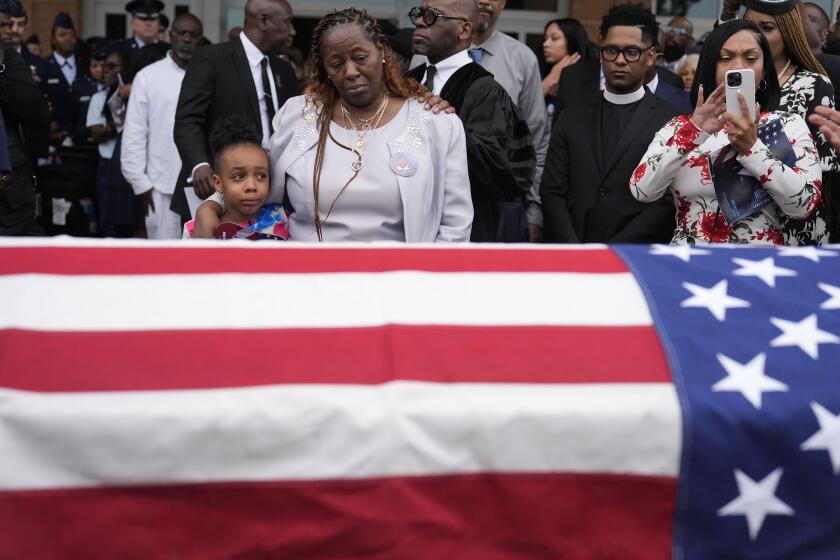Boredom Hangs in the Balance for a Prospective Juror
On Sept. 22, 300 years ago, six women and a man were hanged on a bleak hilltop in Massachusetts in the largest of the multiple executions that followed the Salem witch trials.
On that date this week, in the Assembly Room of the civil Courthouse, County of Los Angeles, my tour of jury duty had entered its third week.
It was not, I thought, a particularly remarkable coincidence. But that’s the thing about jury duty: By the third week, the anticipation of deliberative drama fades, and one begins to strain for a little, well, significance.
Historians believe the Salem witch hysteria probably had less to do with Puritan morbidity than it did with economic envy. I suspect it had something to do with boredom. Life in a 17th-Century Colonial settlement squirming under the grim hand of Calvinist theocracy probably felt a lot like three weeks in the numbing grip of county bureaucracy.
Enough of either one, and a person might find a good demonic possession--even a feigned one--downright diverting. Hanging, I think, takes things too far. But then I’ve only been on jury duty for three weeks. (Late Tuesday morning, in fact, as the person sitting next to me began to loudly crunch his way through his third bag of Fritos, I recalled the Salem defendant who was crushed to death beneath heavy rocks. I wonder how long that takes.)
At any given moment, about 2,000 of Los Angeles County’s residents are fulfilling their duty to serve as jurors in the world’s largest local court. My service had begun two weeks before with an early-morning introductory lecture by a Superior Court judge in the overflowing jury Assembly Room in the Criminal Courts Building. Like nearly all the lawyers appointed to the bench by former Gov. George Deukmejian, this judge was a former prosecutor. Consider her description of how jury service in the criminal courts differed from deliberation on civil cases:
“Here in the criminal courts,” she said, “you’ll find the worst people in the world on their very best behavior. In the civil courts, you’ll find the best people in the world on their worst behavior.”
That was good for a laugh. Unfortunately, the joke was followed by a discussion of jurors’ obligation to maintain faithfully the presumption of innocence when judging people accused of crimes. In other words, jurors, the men and women whose fates you may decide are the worst people in the world trying to fool you by temporarily behaving well. But try to ignore that, and pretend that you think they’re innocent.
Right.
I never got the chance to confront my presumptions about the world’s “worst people.” In short order, I was dispatched to the civil Courthouse to sit in judgment on the “best” people’s affairs. The differences were apparent immediately: The lawyers were better dressed and there was an espresso bar in the plaza outside the jury room.
I never did get on a jury. Once I seemed to come close, but the attorneys asked us to fill out a lengthy questionnaire. One question asked us to describe our attitudes toward the law and “large institutions.”
Quoting Brendan Behan, I wrote, “I respect kindness to human beings first of all, and kindness to animals. . . . I have a total irreverence for anything concerned with society except that which makes the roads safer, the beer stronger, the food cheaper and the old men and women warmer in the winter and happier in the summer.”
I was excused from that panel, which probably was for the good.
Over the long mornings and afternoons that followed, I did a lot of reading and drank a lot of coffee. I learned never, ever sit next to a man wearing reflecting sunglasses and a necklace of plastic bear claws. But, then, I suppose you knew that.
Time, I thought, to go out for coffee.
I read a new biography of James Michael Curley and another of Edmund Burke. Plus four of Patrick O’Brian’s marvelous historical novels. Then, on one seemingly endless afternoon, I began to run low on reading material. I read the entire New York Review of Books from cover to cover, including the personals--SJF, polo-playing psychoanalyst, Joycean and MIT grad, seeks sensitive male under 30 who makes own paper--the ads for Tuscan holiday houses and a seven-page post-structuralist consideration of the poetry of Percy Bysshe Shelley.
And then, I was done. There was nothing left to do but go through the piles of reading material discarded by my fellow jurors. Most of it consisted of supermarket tabloids.
Most were preoccupied with the British royals’ domestic turmoil. Now, I always have regarded the Windsors as one of the world’s least interesting families. To me, the regard in which they are held is one of those inaccessible English enthusiasms, like their fondness for the music of Frederick Delius or their unwholesome affection for spaniels. Still, after a thorough review of the available tabloid literature, I’ve reached the unfashionable conclusion that, if Di really does talk like that on the telephone, Charles is better off schmoozing with his plants.
But even tabloids sometimes contain useful information. One of them had a simple six-question test you can use to determine whether any of your co-workers are disguised “space aliens.” (Turns out there are a lot of them around.) By applying this test’s precepts, I discovered that at least four senior editors of the Los Angeles Times were born on other planets.
Hmm, I mused, this is the sort of information I can use in my next salary negotiation. Then I remembered, I’ve never had a salary negotiation.
Time, I thought, to go out for coffee.
More to Read
Start your day right
Sign up for Essential California for news, features and recommendations from the L.A. Times and beyond in your inbox six days a week.
You may occasionally receive promotional content from the Los Angeles Times.






